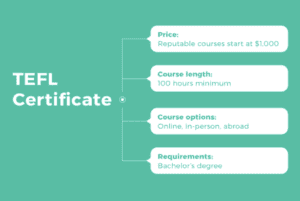South Korea: Our Top Guide For Teaching English in South Korea

Updated On: March 13, 2024 by Ciaran Connolly
Teaching in South Korea has become a popular decision for many young graduates who want a taste of world travel and to be paid for their experiences.
Table of Contents
What you need before you go
There are only 3 things you need before starting your adventure abroad:
- Passport from an English speaking country
- Bachelor’s degree from a University
- TEFL or TESOL qualification
Passports from an English Speaking Country
As long as you carry a passport from a country with English as the first language then you can check this one off straight away. Unfortunately, if you are fluent in English but carry a passport from a country where it is not the first language then you won’t be able to get a contract with a public school. However, it isn’t completely hopeless – you can secure private tutoring roles. These jobs can sometimes offer much better rates of pay but you will have to be brave enough to sort your own visa, find housing and create your own client base.

Bachelor’s Degree From A University
It doesn’t matter what your degree is in, just as long as you have one. Some public schools will stipulate that the degree took 3 years to complete – no one seems to know why – but as most degrees do take this long it shouldn’t be an issue.
TEFL Or TESOL Qualification
No previous teaching experience is required, but if you are working at a public school you will need to have a TEFL or TESOL qualification. Don’t let this put you off, they are easy to get. You can do the courses online from the comfort of your home – some places do offer courses with actual classes to attend but this isn’t necessary to get the qualification. Pro-tip, check websites like Groupon for deals on the online courses. Or if you’re willing to work in a Hagwon (privately owned tutoring academy – more on this later) then you don’t even need this step!

Public School vs. Hagwon
Ok so now you’re ready to start job hunting. There are basically two types of jobs in South Korea: Public School and Hagwons. Hagwons are privately owned tutoring companies and, as such, are more of a business than a school, driven largely by the demands of the students’ parents. There are plenty of horror stories online regarding Hagwons but there are also a lot of people who have worked for these companies and truly enjoyed their time teaching in South Korea. Here’s a break down of the major differences between these two types of jobs to help you make an informed decision:
Getting the Job-South Korea
Public School jobs are much more competitive than hagwons and the only real way to secure one is to apply through a company like EPIK (English Program in Korea) or GEPIK (Gyeonggi-do English Program in Korea). These recruiters will help you secure a job, get a visa and communicate with your school about the contract. All of which can be extremely helpful when moving across the world. But the completion is fierce and you need to apply with these programs 6-7 months in advance of when you plan to leave!
Hagwons, on the other hand, will be hiring all year round, so if you are keen to start your adventure right away then this could be the way to go. February/March is the start of the new semester and so this is usually the best time to job hunt. There are online forums where you can browse hagwon jobs but the most reliable is Dave’s ESL Cafe. There are also recruiters who can help you secure a job, but do your research before going with one as there are a lot of them and they are not government recognised like EPIK and GEPIK.

Working Hours-South Korea
Public School will offer the typical 9-5 schedule of most regular jobs and you will be teaching middle to high schoolers. You will likely be the only foreign teacher at the school and you will see each class of students usually once per week. There will be a Korean teacher to help you if needed and you take your breaks when the students do, lunch is even supplied by the school.
Your contract will stipulate how many teaching hours are required per week and you will be given a set number of paid vacation days as well as any national holidays.
Hagwons work differently. They are generally open from 9am to 10pm and you will either be on the early or late shift. Early shift is teaching the youngest kids who are not old enough yet to be going to public school. Think about Kindergarten. Many teachers love working with kids this young but it can be challenging as this is likely the kids first encounter with English which can make teaching a challenge.
If you are on the late shift you will be teaching middle to high schoolers who come to the Hagwon after school to get extra help with English. The level of English will vary from class to class – but this is also true of public schools. Depending on whether or not you are a night owl, working till 10pm all week can make a social life difficult. However, you will not be the only foreign teacher and so making friends with a similar schedule may be easier.
Generally, Hagwons have longer working hours and less paid holiday days. So make sure you check your contract before signing to make sure it will accommodate any travel plans you might have!

Salary-South Korea
There isn’t a huge difference in public school and hagwon pay but there are certain hagwons that will offer you more money. The general principle of pay is the same for both – your pay will increase each year you stay and upon completion of your contract you will receive an extra month’s pay. Depending on how money motivated you are, a hagwon may offer a more lucrative opportunity.
Public schools generally offer more benefits and a regular work pattern, hagwons are potentially more lucrative but schedules can be difficult if you aren’t a night person. It really depends on the type of person you are and why you are in South Korea if you want to travel and explore – public school will offer more time off and freedom. If you need to clear student loans while having an interesting job – hagwon could be the way to go but the rate of pay isn’t that vastly different.
On the subject of money, there is a third type of job that you should be aware of but approach at your own risk. Private tutoring on the side of teaching is highly lucrative, parents are willing to pay a lot of money to have you tutor their child one on one. But be warned – your visa prohibits this and if you are caught it can lead to deportation and even being blacklisted from teaching in South Korea altogether.

Housing-South Korea
So now you have a better idea of what kind of job you can get, the next logical thing is to work out where you’re going to be staying. The general rule of thumb with housing is that your employer will provide an apartment or give you money towards rent at an apartment that you find. If you are just starting out on your new adventure it will probably be easier to go with a school that has an apartment ready for you, however, if you’re feeling adventurous then you can use craigslist to find available properties.
You will most likely be provided with a studio apartment, which can be a big change if you are used to living with multiple rooms. These apartments can range quite dramatically in size but the general layout is one big room that will combine a living room/bedroom/kitchen and a separate room for your bathroom. Speaking of bathrooms, in Korea, it is most common to have a ‘wet room’ meaning there is a shower head attached to the wall and a drain in the middle of the floor. Everything will get wet so you will need to buy bathroom ‘slippers’ – basically a pair of flip flops you can put on so that your feet don’t get soaked when you’re using the bathroom after a shower.
One thing to be aware of, when you are first arriving at your new school it is very likely that you will be replacing an English teacher who is leaving. So you will be sharing this limited space with someone you have just met for the first few days! The good thing about this, however, is that they will be able to show you around the neighbourhood and help you get settled in. They can even give you hints and tips about your new job.






